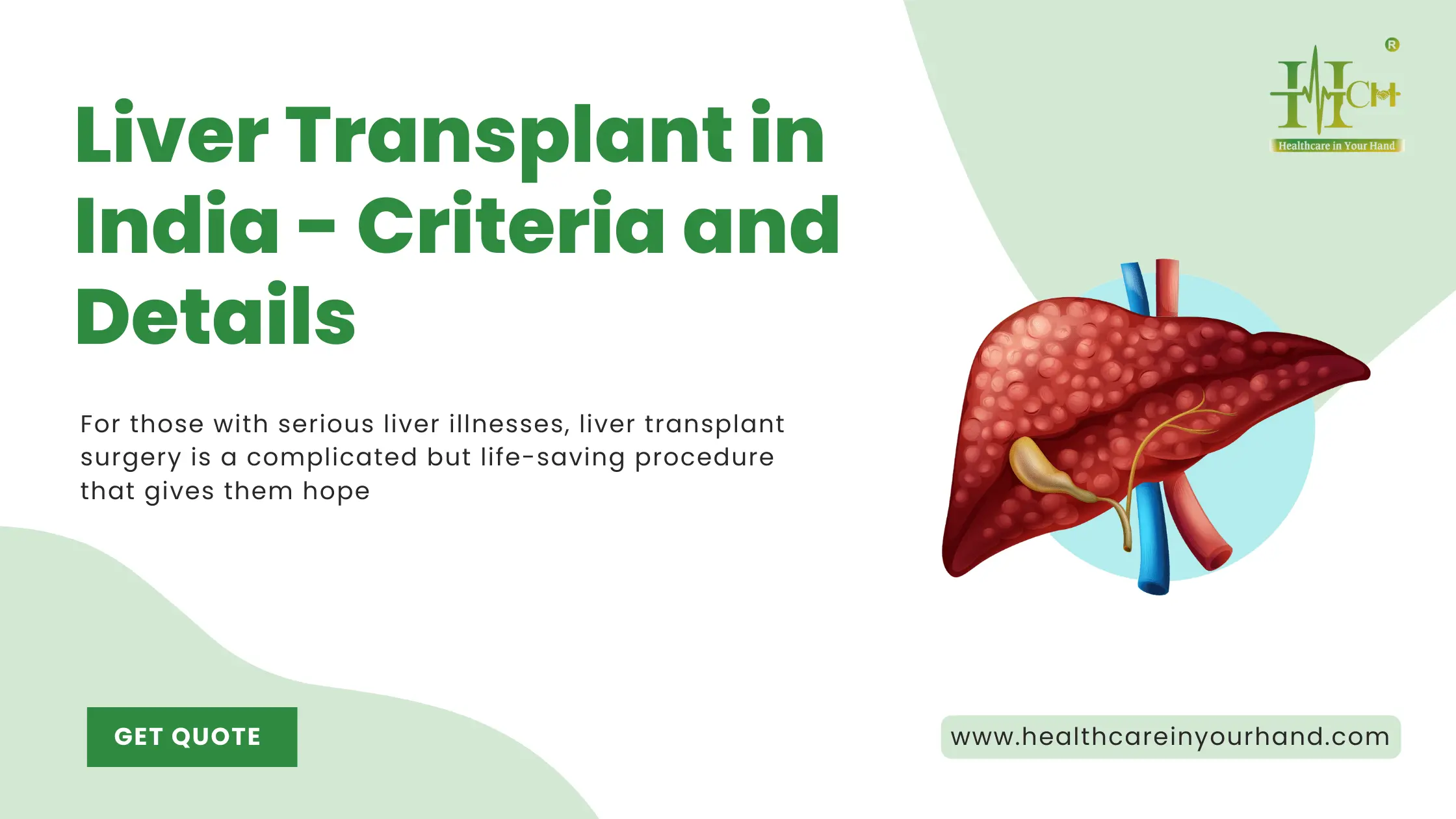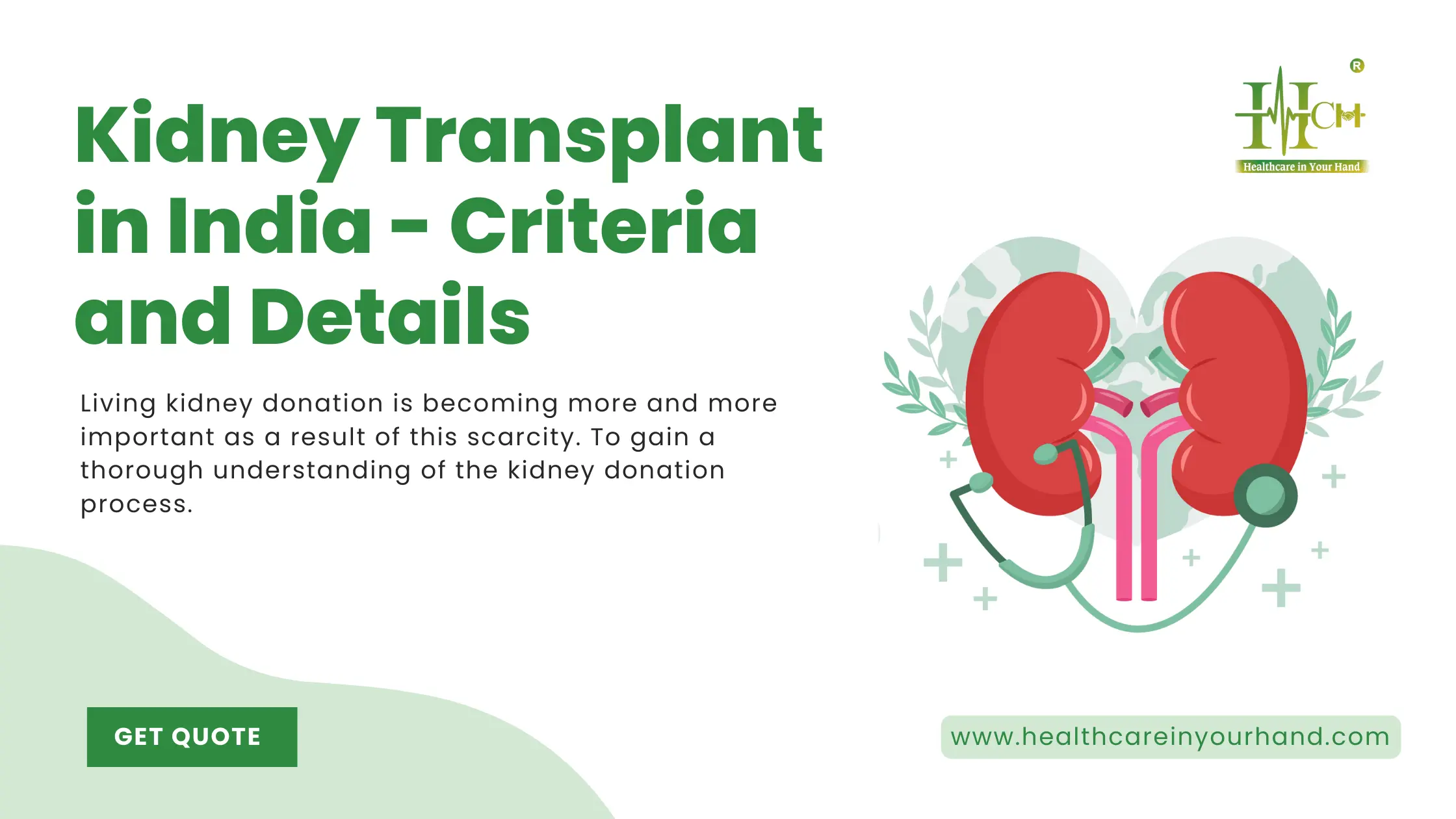Liver Transplant in India - Criteria and Details
- 27 May, 2024
- 1137
- Medical tourism
When a person has a serious
liver ailment, a liver transplant can save their life. It entails using a
healthy liver from a donor to replace a damaged one. However not everyone is
eligible for this process, and donors and recipients must meet certain requirements.
We'll go over the essentials in this blog post to help you comprehend what's
needed for a liver transplant, for both donors and recipients.
Recipient
Criteria for Liver Transplants
Severe Liver condition:
A patient must have a severe liver condition
that is not getting better on medication or other treatments in order to be
eligible for a liver transplant. This may involve diseases such as liver
failure, cirrhosis, or specific hereditary liver problems.
Medical Stability:
The general state of the
recipients' health should be stable. This implies that they shouldn't have any
other medical conditions that could compromise the transplant's success or
increase the chance of complications during the process.
Psychological Assessment:
A psychological assessment
is frequently included in the procedure. This makes sure that recipients are
psychologically ready for the difficulties associated with the transplant and
the recuperation phase following surgery.
Dedication to Post-Transplant Care:
Adherence to a stringent post-transplant care
regimen is necessary for a successful transplant procedure. In order to sustain
the new liver, recipients must be prepared and able to take their medications,
show up for follow-up appointments, and modify their lifestyle as needed.
Who
can be a living liver donor?
A close relative, as
defined by the THO Act, is a living donor for a liver transplant. This includes
the recipient's spouse, parents, siblings, grandparents, and kids. As long as
they are in good health, pass all necessary exams, and comply with all legal
criteria, any of these individuals can donate.
blood group compatible with the recipient.
A close relative or member of the patient's family (wife, husband, mother,
father, brother, sister, son, daughter, grandfather, grandmother, grandchild,
granddaughter) is not eligible to donate. Nor are acquaintances, coworkers, or
neighbors.
the age range of 18 to 55
Not obese, since those who
are obese may have fatty livers
The liver of the donor should be big enough to accommodate both the donor and
the receiver (patient).
Before deciding to volunteer for donation, a donor should be in good general
physical and mental health, have undergone a complete medical and psychiatric
evaluation, and be completely aware of the dangers associated with surgery.
Compatibility of
Blood Groups
|
Donor Blood
Group |
Recipient Blood
Group |
|
O
A
B
AB |
O, A, B or AB A or AB B or AB AB |
How is the assessment of
donors carried out?
There are four stages of donor evaluation, with the more costly and invasive
testing being saved till the end. The testing is done as an outpatient
procedure, usually in conjunction with the recipient evaluation, and takes
roughly seven to ten days.
|
Phase-1 |
Phase-2 |
Phase-3 |
Phase-4 |
|
Liver Function Test
Liver Fat Estimation
|
Liver Volumes
Anatomy of Liver Blood Vessels
|
Tests to Evaluate Other Organ Systems |
Evaluation By Specialists
|
A potential donor might not
be accepted as a consequence of these tests. The family may experience stress
from this, but a dangerous or ineffective transplant is avoided. Next, a
different donor needs to be found. Keep in mind that for a transplant to be
effective, the emotional well-being and willingness of the donor as well as the
patient are crucial. When these aspects are evaluated, individuals should be
counseled if any shortcomings are found.
What does clearance from
the authorization committee mean?
The approval granted by a government-appointed group to perform a living donor
transplant is known as authorization committee clearance. Only when this
approval is received can a transplant procedure be planned. Proofs of identity,
residency, and the link between the donor and the receiver must be submitted to
the committee by both parties.
Document falsification or any other attempt to deceive the authorization
committee is illegal and is punishable severely. Furthermore, the permission
committee is not under the control of the transplant team, and it cannot affect
its choice.
A no-objection certificate
(NOC) from the state of domicile or embassy is also required for donors who are
not close relatives or foreign nationals. Typically, the committee refrains
from granting approval to those who are not close relatives because it is
impossible to ascertain whether or not money has changed hands.
Conclusion
For those with serious
liver illnesses, liver transplant surgery is a complicated but life-saving
procedure that gives them hope. The goal of the liver transplant requirements
for both donors and recipients is to increase the likelihood of a successful transplant
while guaranteeing the security and welfare of all parties.
It is important to collaborate closely with the doctors if you or someone you
know is thinking about having a liver transplant. They may offer tailored
advice based on individual cases.
So are you looking for the best doctor and best hospital for liver
transplant?
Visit. https://www.healthcareinyourhand.com/







